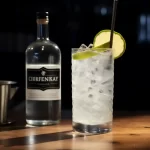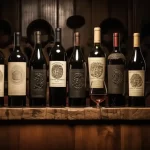Brandy and cognac are two popular alcoholic beverages that are often mentioned in the same breath. While both are derived from grapes and fall under the category of brandy, there are distinct differences between the two. In this article, we will explore the unique characteristics of brandy and cognac, their production processes, and the factors that set them apart.
1. Introduction
Brandy and cognac have a rich history that dates back centuries. These beverages have captivated the palates of connoisseurs around the world and are renowned for their complex flavors and aromas. While both are made from grapes, they have distinct characteristics that make them unique. In this article, we will delve into the intricacies of brandy and cognac, uncovering their differences and helping you make an informed choice when selecting your preferred spirit.
2. What is Brandy?
Brandy is a broad term that encompasses a wide range of spirits made from distilled wine or fermented fruit juice. It is typically aged in wooden barrels, which impart unique flavors and characteristics to the final product. Brandy can be made from various fruits, including grapes, apples, pears, and cherries. However, when the term “brandy” is used without further specification, it usually refers to grape brandy.
3. The Origins of Cognac
Cognac, on the other hand, is a type of brandy that has specific origins and production methods. It is named after the town of Cognac in France, where it has been produced for centuries. The region’s chalky soil and maritime climate create the perfect conditions for growing grapes that are well-suited for cognac production.
4. Production Process of Brandy
The production process of brandy begins with the fermentation of fruit juice, usually obtained from grapes. After fermentation, the liquid is distilled to increase its alcohol content. The distilled spirit is then aged in oak barrels, allowing it to develop complex flavors and aromas. The duration of aging can vary depending on the desired characteristics of the final product.
5. Production Process of Cognac
Cognac follows a similar production process to brandy but with stricter regulations. The grapes used for cognac must come from designated vineyards in the Cognac region of France. The distillation process takes place in copper stills known as “charentais.” Cognac is then aged in oak barrels for a minimum of two years, although many high-quality cognacs are aged for much longer.
6. Aging and Maturation
Aging plays a crucial role in the development of both brandy and cognac. The time spent in oak barrels allows the spirits to interact with the wood, absorbing tannins and other compounds that contribute to their unique flavors. Brandy is typically aged for a shorter period compared to cognac, resulting in a lighter and fruitier profile. Cognac, with its longer aging requirements, tends to have a more complex and refined character.
7. Flavor Profiles
Brandy and cognac exhibit different flavor profiles due to variations in production methods and aging. Brandy often showcases fruity and floral notes, with hints of vanilla and spices. On the other hand, cognac tends to have deeper and richer flavors, often featuring dried fruit, nuts, and oak influences. The aging process imparts additional complexity and depth to both spirits, offering a wide range of tasting experiences.
8. Serving and Pairing
Brandy and cognac can be enjoyed in various ways. They can be sipped neat or on the rocks to savor their intricate flavors. Brandy also serves as a versatile base for cocktails, adding depth and complexity to classic recipes. When it comes to pairing, brandy pairs well with dark chocolate, cheeses, and desserts, while cognac complements cigars, chocolate truffles, and gourmet cuisine.
9. Popular Brands
There are numerous brands that offer exceptional brandy and cognac options. Some of the well-known brandy brands include Hennessy, Rémy Martin, and Torres. As for cognac, renowned names like Martell, Courvoisier, and Hine have established themselves as purveyors of fine cognacs that embody the essence of the region.
10. Brandy vs. Cognac: Key Differences
While both brandy and cognac fall under the category of distilled spirits made from grapes, there are key differences that set them apart. The most notable distinctions include:
- Origin: Brandy can be produced in various countries, while cognac must come from the Cognac region in France.
- Production Methods: Cognac follows specific production regulations, including the use of designated vineyards and charentais stills.
- Aging Requirements: Cognac has a minimum aging requirement of two years, whereas brandy can have shorter aging periods.
- Flavor Profiles: Brandy tends to have a lighter and fruitier profile, while cognac offers more complexity and richness.
11. Which One Should You Choose?
Choosing between brandy and cognac ultimately depends on personal preferences and the desired drinking experience. If you prefer a lighter and fruit-forward spirit, brandy might be the ideal choice. On the other hand, if you seek a more refined and complex flavor profile, exploring the world of cognac would be a rewarding endeavor. Experimenting with different brands and expressions will help you discover the nuances that appeal to your taste buds.
12. Conclusion
Brandy and cognac, both derived from grapes, captivate enthusiasts with their distinctive flavors and rich histories. While brandy encompasses a broader range of spirits, cognac holds a special place in the world of brandy due to its specific origins and production methods. Understanding the differences between brandy and cognac allows you to make an informed choice and embark on a sensory journey that unravels the complexities of these remarkable spirits.
13. FAQs
Q1. Can brandy and cognac be used interchangeably in cocktails?
No, brandy and cognac have distinct flavor profiles that can significantly impact the taste of a cocktail. While brandy is more versatile and often used in cocktails, substituting cognac may alter the intended flavor balance of the drink.
Q2. Can I age brandy or cognac at home?
Brandy and cognac aging is a complex process that requires proper equipment and expertise. It is recommended to leave aging to professional producers who have the necessary facilities and knowledge to create exceptional spirits.
Q3. Are brandy and cognac gluten-free?
Yes, both brandy and cognac are gluten-free as they are distilled from grapes or fermented fruit juices, which do not contain gluten.
Q4. Can I visit the Cognac region in France for brandy and cognac tours?
Yes, the Cognac region offers numerous distilleries and vineyards that welcome visitors for tours and tastings. It’s an excellent opportunity to learn more about the production processes and sample exceptional spirits firsthand.
Q5. How should brandy and cognac be stored?
Brandy and cognac should be stored in a cool, dark place, away from direct sunlight and extreme temperature fluctuations. Proper storage ensures the preservation of their flavors and quality over an extended period.









